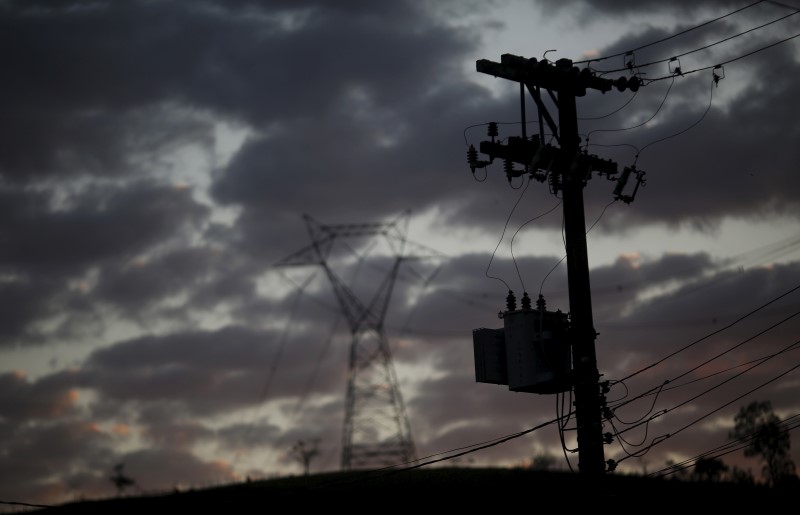By Luciano Costa
SAO PAULO (Reuters) - With electricity demand in Brazil slashed by the harshest recession in a century, the government is evaluating an innovative kind of power auction - to allow companies to bid for the right to cancel licenses to build plants.
Firms had rushed to bid for licenses to supply the power needed to fuel growth as a commodities-fueled boom drove annual economic growth above 7 percent in 2010 and cheap credit sparked a consumer spending spree.
But a collapse in commodities prices tipped Brazil into a recession that has shrunk economic output by more than 7 percent since 2015, crippling demand for electricity and leaving an excess of generating capacity.
The "reverse auction," which Energy Minister Fernando Coelho Filho says could start within months, would provide an escape for financially distressed firms holding licenses for power projects, particularly in the solar and wind sectors, that they are unable to build.
Without a formal cancellation, which includes heavy fines for companies that failed their contractual responsibilities, the government cannot pass on these projects to other firms.
The auction, which the Energy Ministry is in the process of finalising, would allow companies to bid to return their licenses by making "exit payments" that would be lower than the potential fines, according to a draft proposal.
It would also allow companies to avoid lengthy possible litigation with the government and other parties, experts said.
With the prospect of a return to economic growth this year in Latin America's largest economy, the government hopes the reverse auction will allow some fresh investment to return to the sector.
"The idea is good. It's better than to keep fighting," said Tiago Figueiró, a lawyer at Veirano Advogados, which specializes in the Brazilian power sector. "This would be a quicker solution," he said.
ESCAPE
Several power firms are negotiating with Brazil's electricity regulator Aneel for a way out of the situation, trying to escape penalties for not delivering projects.
Aneel estimates that around 1.3 gigawatts of wind and solar power projects have a very low possibility of entering operation, representing around 12 percent of Brazil's generating capacity for the sector.
Projects suffering from problems include those run by Brazil's Renova Energia (SA:RNEW11), Spain's Fotowatio and Solatio, and Portugal's Tecneira.
Cancellation fines could go up to 15 percent of the project value and companies would be prohibited from taking part in future licensing rounds, putting a brake on the development of the sector just as the economy starts growing.
Brazil's power consumption fell 2.1 percent in 2015 and 0.9 percent in 2016, the first two annual declines since the 2008-2009 financial crisis.
With demand weak, many firms holding licenses to build new projects saw their plans run into trouble due to expensive credit as the central bank hiked rates to a decade-high of 14.25 percent to tackle stubbornly high inflation.
Meanwhile, a slide in the real currency raised the cost of imported equipment, just when the recession caused the collapse of some local suppliers.
GROWTH
The government hopes the auction would clear the way for new licensing rounds later. It was forced to cancel an auction for new solar and wind generation in December due to lack of demand.
Despite the cancellation and existing oversupply, experts say foreign and domestic investors in the sector are showing signs of renewed appetite this year as Brazil prepares to return to growth.
"We are seeing a lot of interest from investors to enter the sector or expand there," said Fabiano Luz de Brito, electricity specialist at legal firm Mattos Filho.
"The reverse auction would allow us to fine tune the market."
The largest foreign investors in Brazil's electricity market - France's Engie (PA:ENGIE), China Three Gorges Corp and AES Corp (N:AES) - have all publicly stated their interest recently in investing in new renewable energy projects.
Some experts have expressed concern the reverse auction may be akin to an amnesty for investors who have not performed, which could provide an incentive for companies in the future to fail to meet commitments.
The director general of Aneel, Romeu Rufino, said last month it should be stressed the auction was not a "general and full pardon" for investors.

Wind power accounts for roughly 7 percent of Brazil's total installed generating capacity of 151 gigawatts. With some of the world's largest rivers, Brazil generates some 60 percent of its electricity from cheap and abundant hydroelectric power.